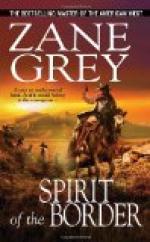“We’re getting warnings enough. Do you appreciate that?” asked Edwards. “‘Pipe and Half King have been influenced by Girty.’ Evidently the writer deemed that brief sentence of sufficient meaning.”
“Edwards, we’re preachers. We can’t understand such things. I am learning, at least something every day. Colonel Zane advised us not to come here. Wetzel said, ‘Go back to Fort Henry.’ Girty warned us, and now comes this peremptory order from Isaac Zane.”
“Well?”
“It means that these border men see what we will not admit. We ministers have such hope and trust in God that we can not realize the dangers of this life. I fear that our work has been in vain.”
“Never. We have already saved many souls. Do not be discouraged.”
All this time the runner had stood near at hand straight as an arrow. Presently Edwards suggested that the Wyandot was waiting to be questioned, and accordingly he asked the Indian if he had anything further to communicate.
“Huron—go by—paleface.” Here he held up both hands and shut his fists several times, evidently enumerating how many white men he had seen. “Here—when—high—sun.”
With that he bounded lightly past them, and loped off with an even, swinging stride.
“What did he mean?” asked Jim, almost sure he had not heard the runner aright.
“He meant that a party of white men are approaching, and will be here by noon. I never knew an Indian runner to carry unreliable information. We have joyful news, both in regard to your brother, and the Village of Peace. Let us go in to tell the others.”
The Huron runner’s report proved to be correct. Shortly before noon signals from Indian scouts proclaimed the approach of a band of white men. Evidently Girty’s forces had knowledge beforehand of the proximity of this band, for the signals created no excitement. The Indians expressed only a lazy curiosity. Soon several Delaware scouts appeared, escorting a large party of frontiersmen.
These men turned out to be Captain Williamson’s force, which had been out on an expedition after a marauding tribe of Chippewas. This last named tribe had recently harried the remote settlers, and committed depredations on the outskirts of the white settlements eastward. The company was composed of men who had served in the garrison at Fort Pitt, and hunters and backwoodsmen from Yellow Creek and Fort Henry. The captain himself was a typical borderman, rough and bluff, hardened by long years of border life, and, like most pioneers, having no more use for an Indian than for a snake. He had led his party after the marauders, and surprised and slaughtered nearly all of them. Returning eastward he had passed through Goshocking, where he learned of the muttering storm rising over the Village of Peace, and had come more out of curiosity than hope to avert misfortune.
The advent of so many frontiersmen seemed a godsend to the perplexed and worried missionaries. They welcomed the newcomers most heartily. Beds were made in several of the newly erected cabins; the village was given over for the comfort of the frontiersmen. Edwards conducted Captain Williamson through the shops and schools, and the old borderman’s weather-beaten face expressed a comical surprise.




